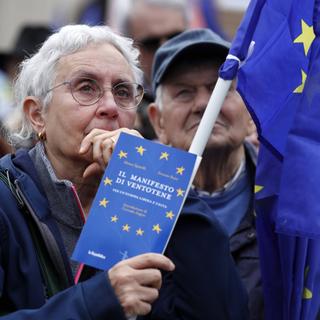


Italy turns its back on its pioneers' legacy in founding the EU
BackgroundItaly, a key player in the creation of the European Union, born from the rejection of nationalism after World War II, has gradually turned away from federalism. Today, the shift has led the Meloni government to deny the legacy of Spinelli and De Gasperi, Italian fathers of modern Europe.
Europe is also an archipelago. It includes a myriad of small islands, lying off the familiar contours of its coasts, where, at times, history can incidentally be written. The volcanic rock of Ventotene, rising 25 nautical miles off the coast of the southern Italian region of Campania, in the Tyrrhenian Sea, is one of them. Indeed, on its desolate 1.5 square kilometer surface, a certain idea of Europe even sprang up once. An Italian idea.
The island, which had served as an anchoring point for peaceful fishing colonies and a place of exile since the Roman Empire, was used by Benito Mussolini's regime to isolate those considered to have dangerous ideas. Hundreds of prisoners, though deprived of their freedom by the island's constraints, formed a small antifascist society there, as their jailers could never completely prevent them from thinking. Therefore, in 1941, while war ravaged Europe, two of these prisoners, the liberal Ernesto Rossi (1897-1967) and a former communist who broke with the party, Altiero Spinelli (1907-1986), secretly wrote a text, on cigarette paper, which would come to be considered foundational for European federalism, the Ventotene Manifesto.
Anti-totalitarian, anti-racist and attentive to the plights of minorities, the manifesto advocated for a continental revolution against nationalism and economic oligarchies, which, once the Third Reich was defeated, was intended to end in the construction of a unified and democratic Europe, complete with its own army.
A manifesto that is still a reference
You have 87.74% of this article left to read. The rest is for subscribers only.
